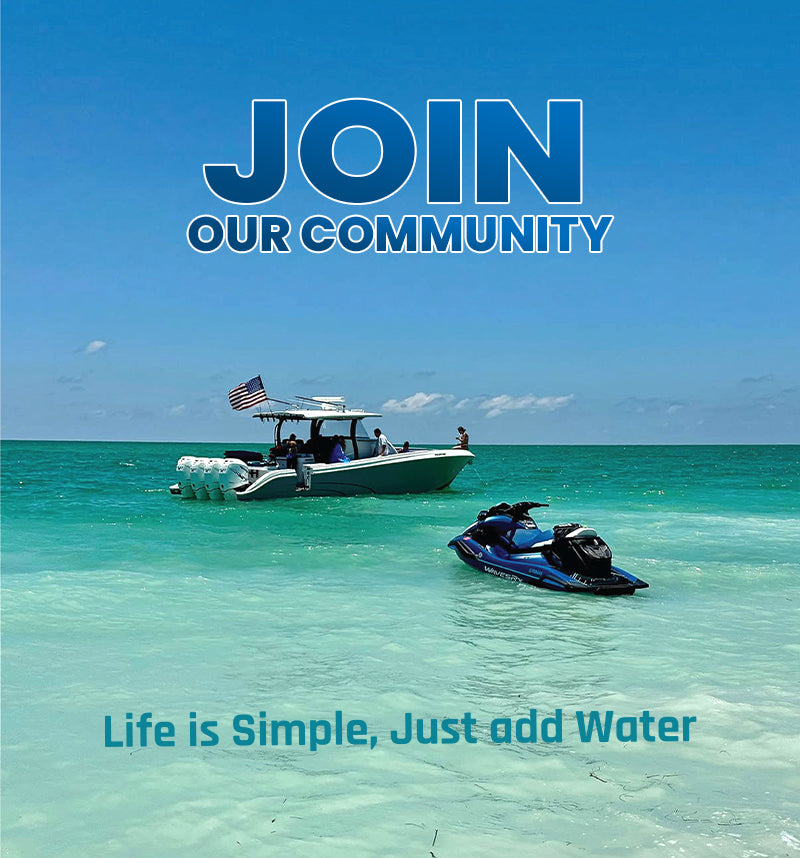First Aid: Be Prepared to Keep Your Family Safe on the Water
Spending a day on the water can be one of the most enjoyable activities for you and your family. Whether you're boating, jet skiing, or simply enjoying a swim, the thrill and fun are unmatched. However, the water can also bring unexpected challenges. That is why it's crucial to be prepared for any situation, especially when it comes to first aid.
Having a well-stocked first aid kit and knowing how to use it can make all the difference in an emergency. Accidents and injuries can happen at any time, and being prepared helps you take immediate action. This can prevent minor injuries from becoming serious and ensure that you and your loved ones stay safe.
In this article, we will cover essential items for your first aid kit, how to handle common water-related injuries, creating an emergency plan, and tips for staying safe on the water. Let’s dive in and make sure you're fully equipped to keep your family safe while enjoying your time on the water.
Essential Items for Your First Aid Kit
Equipping your first aid kit with the right items is crucial for quick and effective care in case of an injury. Start with the basics: bandages in various sizes, gauze pads, adhesive tape, and antiseptic wipes. These items help treat cuts, scrapes, and minor wounds. Include insect sting relief pads and antibiotic ointments to prevent infections and soothe irritation.
Add tools like tweezers for removing splinters, scissors for cutting tape and bandages, and a digital thermometer to check for fevers. Non-latex gloves are also important for keeping your hands clean while administering first aid. For pain relief and swelling, pack instant cold packs and a few packets of pain relievers like ibuprofen or acetaminophen.
Save space for some specialized items as well. Waterproof bandages and medical tape are useful since you're dealing with water activities. Sunscreen and aloe vera gel can protect and treat sunburns, while motion sickness tablets can help those prone to seasickness. Keep these items in a waterproof container to ensure they stay dry and ready to use. A well-stocked first aid kit provides you with the tools necessary to handle minor injuries and emergencies that might arise on the water.
How to Handle Common Water-Related Injuries
Knowing how to handle common water-related injuries can make a big difference in an emergency. One frequent injury is a cut or scrape from rocks or shells. If this happens, clean the wound with fresh water and use antiseptic wipes from your first aid kit. Apply a bandage to protect the area from further damage and infection.
Another common issue is sunburn. After spending a long day in the sun, you might notice red and painful skin. Treat sunburn by applying aloe vera gel to the affected area. Drinking plenty of water can also help you stay hydrated and speed up recovery.
Jellyfish stings are another risk. If someone gets stung by a jellyfish, rinse the area with vinegar to neutralize the sting and to prevent the venom from spreading. Remove any tentacles using tweezers, but never rub the area as it can worsen the injury. Apply a cold pack to reduce pain and swelling.
For minor sprains or strains, elevate the injured limb and apply an instant cold pack to reduce swelling. Over-the-counter pain relievers like ibuprofen can help manage pain. Recognizing and treating these common injuries allows you to provide immediate care, reducing the risk of complications and ensuring a quicker recovery.
Creating an Emergency Plan
An emergency plan is essential for ensuring everyone knows how to act in case of an emergency on the water. Start by designating roles for each family member. Assign someone to be responsible for calling emergency services, another to gather safety gear, and someone else to provide first aid if needed. This way, everyone knows what to do, and no time is wasted.
Next, make sure everyone knows how to use the safety equipment, including life jackets, fire extinguishers, and flares. Conduct regular drills to practice these procedures. Familiarize your family with common signals for distress and emergency communication methods. When everyone knows what to do, it reduces panic and improves the chances of handling emergencies efficiently.
Create a list of emergency contacts and keep it in a waterproof container. Include the numbers for local coast guard, marine patrol, and any nearby medical facilities. Share your float plan with someone on shore before heading out. This plan should include your expected route, destinations, and return time. If you don't return as scheduled, rescuers will have vital information to start a search.
Tips for Staying Safe on the Water
Staying safe on the water involves more than just having a first aid kit. Here are some essential tips to keep your family safe. First, always wear life jackets. Even strong swimmers can encounter trouble, and life jackets provide crucial support. Make sure the jackets fit well and are in good condition.
Second, check the weather forecast before heading out. Avoid going out in rough weather or when storms are expected. Sudden changes in weather can lead to dangerous situations. Keep an eye on the sky and return to shore if you notice dark clouds or sudden wind changes.
Third, avoid alcohol. Drinking impairs your ability to make decisions and react quickly. Stay sober to ensure you can handle any emergencies that may arise. Additionally, good hydration and sun protection are essential. Drink plenty of water and apply sunscreen regularly to protect against dehydration and sunburn. By following these tips, you can greatly reduce the risk of accidents and enjoy a safe day on the water.
Conclusion
Being prepared is the key to keeping your family safe on the water. By having a well-stocked first aid kit and knowing how to handle common injuries, you can respond quickly to emergencies. Creating an emergency plan ensures everyone knows what to do and reduces panic. Following safety tips not only helps prevent accidents but also ensures a safer, more enjoyable experience.
Make sure you're fully equipped to handle any situation that might arise while out on the water. Investing in the right safety gear and following best practices can make all the difference. For high-quality marine accessories, boat cleaning products, and safety gear, visit WavesRx. We offer a wide range of products designed to help you enjoy your time on the water safely and securely. Stay prepared, stay safe, and enjoy your water adventures with WavesRx.



